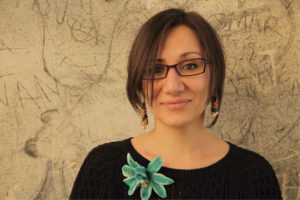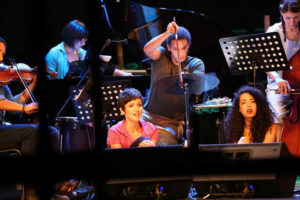By Hannah Gallagher
Listening to the opening of Baqaya, a work for solo piano, you feel a sense of introspection, spirit, and sensitivity. The melody unfolds, reaching skywards as though trying to discover itself within and without before it returns back down to delve into a deeper layer of sound. The music cuts to a rhythm with both hard and soft edges, sparking a fire of determination and strength. What follows are spaces that allow the listener to both breathe and be rendered breathless. This is the music of Palestinian pianist and composer Dina Shilleh.
Dina lives, works, and creates in Ramallah. A self-taught composer, she holds bachelor and master of music degrees in piano performance from Lawrence University and the University of Massachusetts, Amherst, respectively. She began her studies in Serbia, where she lived until the age of 11 years before she returned to Ramallah with her family. The entanglement of places, traditions, and languages feature in Dina’s diligent and decisive work, as she challenges, unravels, and weaves together the ties and connections that tether her to the many worlds around her. Through this investigation, she uncovers beauty and honesty, moving the listener to contemplate and confront both the light and dark of their day.
Dina’s successes are numerous and continue to grow. She was awarded the Young Artist Award by the Palestine In and Out competition in 2015, has held residence at Cité Internationale des Arts in Paris, and has been commissioned as a composer locally and internationally, most recently by the ensemble Mimesis that premiered her work for soprano, saxophone, and piano at the prestigious Carnegie Hall in New York City in January 2020. Her compositions have been performed in the Middle East, Europe, and the United States at prestigious venues that include the Arab World Institute in Paris and Dublin City Hall. As I Tell It, a song cycle Dina set to poetry by Tamik Hamdan, was performed at Carnegie in 2019.
Dina’s works include many exciting collaborations. In 2018, she was a member of the team that created the musical theatre piece Hunger – co-produced with Maya Khaldi, set to a text by Dalia Taha – that enjoyed great success, with sold-out shows of its opening performances in Ramallah’s City Hall. In Letters to Palestine (2016), an album of piano music by Palestinian composers, she is featured as composer, pianist, and artistic director. Her ongoing collaboration with composer Robin Burlton continues to yield numerous musical settings of contemporary Arabic poetry for various ensembles.
Dina explains: “Music only lives when it is being played.” For this reason, she writes with actual instrumentalists in mind. She has written extensively for her piano duet with Irish pianist Hannah Gallagher, for string quartet, various chamber combinations, and soon will premiere new works for voice and ensemble. As Dina explores her craft, she makes discoveries of form, of ways to construct sound through repetition and processes, and through experimentation with instruments and their performance techniques. A great example is Marketplace, a work that takes the listener on an audio walk through Ramallah’s souq. She skilfully plays with extended piano techniques to evoke sounds of the hustle and bustle of the busy city market with footsteps, gates opening and shutting, cars honking in heavy traffic. This translation of a soundscape into fully composed music exemplifies Dina’s fine and careful ear as well as her talent to craft her thoughts onto paper.
Throughout her career, Dina has played an important supportive role in Ramallah’s music scene. Each spring, she curates Gradus, a concert series at Khalil Sakakini Cultural Center, and currently is head of the piano section at the Edward Said National Conservatory of Music, where she is a dedicated teacher and brings along her creative spirit and energy.
In 2017, Dina released her debut album Sudfa, a collection of compositions for solo piano, piano duet, and various ensembles that involve voice, clarinet, viola and piano. The works presented here draw on folk melodies and explore both western and eastern harmonies. Dina reveals a soft line between sound-worlds, a line on which she treads carefully yet intrepidly.



